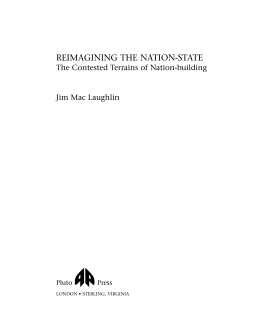
Additional Information
Book Details
Abstract
This book assesses competing modes of nation-building and nationalism through a critical reappraisal of the works of key theorists such as Benedict Anderson and Eric Hobsbawm. Exploring the processes of nation building from a variety of ethnic and social class contexts, it focuses on the contested terrain within which nationalist ideologies are often rooted.
Mac Laughlin offers a theoretical and empirical analysis of nation building, taking as a case study the historical connections between Ireland and Great Britain in the clash between 'big nation' historic British nationalism on the one hand, and minority Irish nationalism on the other. Locating the origins of the historic nation in the seventeenth and eighteenth centuries, Mac Laughlin emphasises the difficulties, and specificity, of minority nationalism in the nineteenth century.
In so doing he calls for a place-centred approach which recognises the symbolic and socio-economic significance of territory to the different scales of nation-building. Exploring the evolution of Irish Nationalism, Reimaging the Nation State also shows how minority nations can challenge the hegemony of dominant states and threaten the territorial integrity of historic nations.
'A thought provoking, insightful analysis of Irish nationalism. The text is eloquently written and engages the reader due to its animated style'
Royal Geographical Society
'A sensible, subtle, and wide-ranging analysis of nation-building in Ireland. A major contribution to the discussion'
Immanuel Wallerstein, Yale University
'The most important book on nation, nationality and nationalism to have come out of Ireland in 20 years'
Irish Democrat
'Shows the new angles can still be found on the big picture'
Irish Studies Review
'McLaughlin writes with a sharp brilliance about the intersection between places, politics, systems and cultures'
Fintan O’Toole
Table of Contents
| Section Title | Page | Action | Price |
|---|---|---|---|
| Contents | iii | ||
| Acknowledgements | iv | ||
| Introduction | 1 | ||
| 1. The Naturalisation of Nation-building in the Nineteenth Century: The Anomalies of Minority Nations | 10 | ||
| Nationalism and the Modern Nation- state | 10 | ||
| The Ethnic Intelligentsia and the 'Naturalisation' of the Nation-state | 20 | ||
| Structuralist versus Hegelian Perspectives on the Nation-state | 29 | ||
| Towards a Gramscian Model of Nation-building and Nationalism | 37 | ||
| 2. English Nation-building and Seventeenth-century Ireland: The 'Fabulous Geographies' of Nation-building | 43 | ||
| 'Fabulous Geographies' of Ireland in the Seventeenth Century | 44 | ||
| Race-thinking and the English Mission Civilatrice in Seventeenth-century Ireland | 52 | ||
| ‘Pollution' through Miscegenation: Fear of the Native in Colonial Ireland | 63 | ||
| 3. Political Arithmetic' and the Early Origins of Ethnic Minorities | 70 | ||
| Race, Political Arithmetic and the Irish | 70 | ||
| Ireland: English Colony or 'Home Country' of England? | 76 | ||
| Representations of Ireland and the Irish in Colonial Art and History | 82 | ||
| 4. Theorising the Nation: 'Peoplehood' and Nationhood as 'Historical Happenings' | 91 | ||
| Nation as Construct | 91 | ||
| Anderson ’s Nation: An ‘Imagined Community ’? | 94 | ||
| Hobsbawm ’s Nation and the Nation in Ireland | 101 | ||
| Wallerstein ’s ‘Peoplehood ’and Historical Constructs of Ulster\r and Ireland in the Nineteenth Century | 121 | ||
| Nation, Place and Class in Nineteenth-century Ireland | 129 | ||
| 5. Nationalising People, Places and Historical Records in Nineteenth-century Ireland | 135 | ||
| Nationalist Myths and the Nationalisation of the Past | 135 | ||
| Penal Laws and Nationalist History | 145 | ||
| Plebeian Rebels: The Limits of Popular Protest in Nation- building Ireland | 156 | ||
| 6. Social and Ethnic Collectivities in Nation-building Ireland | 165 | ||
| ‘Pirating ’the Nation | 165 | ||
| Irish Nationalism and the Fragmentation of European Revolutionary Tradition | 168 | ||
| Irish Nationalism: A Territorialising Force? | 173 | ||
| Malthusian Defences of 'Vanishing' Ireland | 178 | ||
| Nationalist Reactions to Irish Emigration | 184 | ||
| 7. Pressing Home the Nation: Print Capitalism and 'Imagined Communities' in the Nineteenth Century | 187 | ||
| Print Capitalism, Social Communication and Nation- building | 188 | ||
| Press and Nation in Catholic Ireland | 199 | ||
| 8. Pamphlet Wars and Provincial Newspapers in Protestant Ulster | 210 | ||
| A Protestant Press for a Protestant People | 210 | ||
| The Pamphlet War | 213 | ||
| Unionisation of Ulster | 217 | ||
| 9. The Surveillance State and the Imagined Community | 227 | ||
| Mapping the Imagined Community of the Nation | 227 | ||
| Maps as Images of the ‘Imagined Community ’ in Ireland | 229 | ||
| Map-making as Cartographic Rebellion | 233 | ||
| Mapping the Subject | 236 | ||
| 10. Local Politics and Nation-building: The Grassroots of Nationalist Hegemony | 242 | ||
| Towards a Gramscian Geography of Nationalist Hegemony | 242 | ||
| The Nationalisation of Local Places | 245 | ||
| Legitimising Nationalism: Local Custom versus Alien Rule | 254 | ||
| Forging a National Imagination in Late Nineteenth-century Donegal | 257 | ||
| The 'Natural Leaders' of the Nation | 262 | ||
| Priestly Politics and Nationalist Hegemony in Donegal | 264 | ||
| Bibliography | 272 | ||
| Index | 285 | ||
| Abdel-Malek, Anwar, 235 | 235 | ||
| Abercorn, Duke of, 220 | 220 | ||
| Absentee landlords 68-70 | 68 | ||
| Academic nationalists 24-7 | 24 | ||
| Agnew, John A. 24 | 24 | ||
| Alien rule | 254 |
